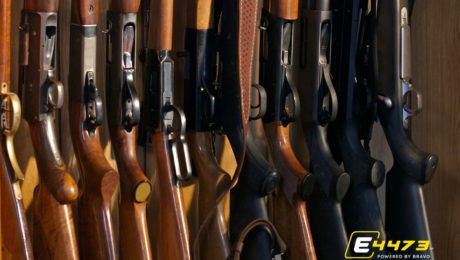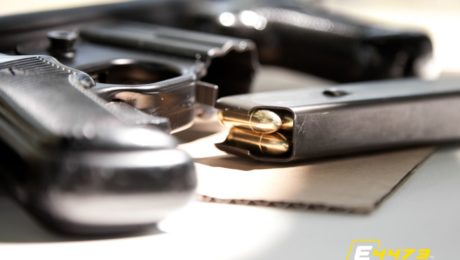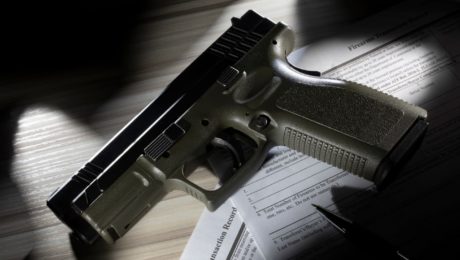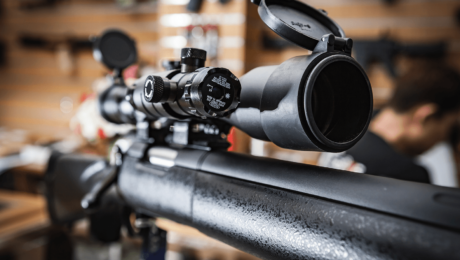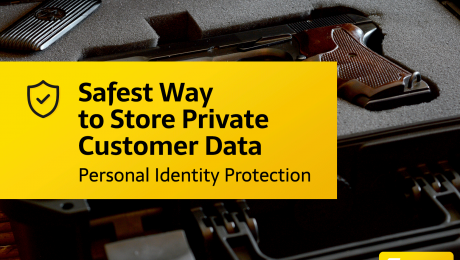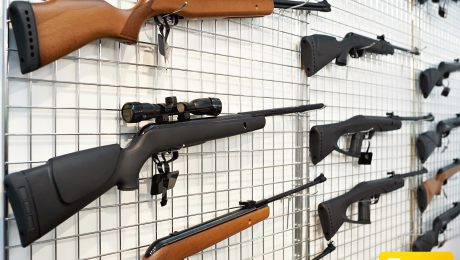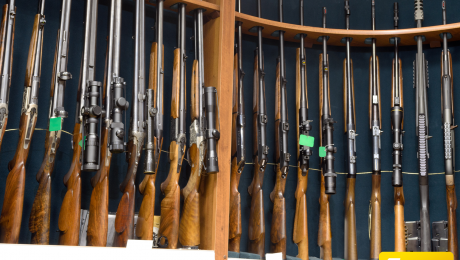Conquering ATF Audits: Best Software for Faster and Smoother Inspections
Monday, May 13 2024
For any firearms dealer, an ATF audit can trigger a wave of anxiety. The prospect of inspectors scrutinizing your records, inventory, and compliance procedures can be daunting. However, with the right tools and preparation, you can navigate ATF audits with confidence and minimize disruption to your business. This article dives deep into the importance of using software specifically designed to streamline ATF compliance for gun stores, Federal Firearms License (FFL) holders, and gun shops. We’ll explore the challenges of manual recordkeeping, the benefits of automation, and introduce you to Bravo Store Systems – a software solution that empowers you to conquer ATF audits with ease. The Perils of Paper Trails: Why Manual Systems Slow You Down Traditionally, FFLs and gun stores have relied on paper-based systems for recordkeeping. While this approach might seem manageable at first, it quickly becomes cumbersome as your business grows. Here’s how manual systems hinder your ability to prepare for and excel during ATF audits: Time-Consuming Data Entry: Manually entering gun sales information and inventory details is a tedious and error-prone process. This not only eats into your valuable time but also increases the risk of mistakes that could raise red flags during an audit. Data Inaccessibility: Locating specific records amidst a mountain of paperwork can be a nightmare. Auditors expect instant access to information, and delays in retrieving data can cast a negative light on your compliance practices. Inconsistent Recordkeeping: Maintaining consistent formatting and organization across paper records can be challenging. Inconsistencies can make it difficult for both you and auditors to track information and identify trends. Limited Reporting Capabilities: Extracting meaningful insights from handwritten logs is a near-impossible task. Without clear, concise reports, you’ll struggle to identify areas for improvement and optimize your compliance procedures. Embrace Automation: How Software Simplifies ATF Compliance Investing in software specifically designed for FFLs can revolutionize your approach to ATF compliance. Here’s how these tools empower you to streamline recordkeeping and conquer those audits: Effortless Data Entry: Software automates much of the data entry process, saving you countless hours and minimizing the risk of errors. Simply scan barcodes, enter digital signatures, and let the software handle the rest. Instantaneous Access: With a few clicks, you can access any transaction record, inventory item, or compliance document. This ensures that auditors can swiftly review the information they need. Standardized Recordkeeping: Software enforces consistent formatting and data entry practices across your records. This provides a clear and organized view of your operations for both internal review and external audits. Powerful Reporting and Analytics: Generate comprehensive reports that detail sales trends, inventory status, and compliance metrics. Utilize these insights to identify potential risks and proactively address any red flags before ATF arrives. Introducing Bravo Store Systems: Your All-in-One Compliance Solution Bravo Store Systems positions itself as the #1 point-of-sale (POS) software solution specifically designed for specialty retailers like gun stores. Their software goes beyond traditional POS functionality, offering a comprehensive suite of features that streamline ATF compliance: Integrated A&D Book Management: Maintain a digital A&D book with automatic updates for every FFl transaction. This ensures complete and accurate records for easy access during audits. Digital 4473 Management: Process background checks and electronically submit ATF Form 4473 directly through the software. This eliminates paper clutter and ensures timely submissions. Guaranteed Compliance: Bravo’s software incorporates industry best practices and regulatory updates to help you maintain compliance with ATF regulations. Real-Time Inventory Tracking: Track your inventory in real-time, ensuring accurate reporting and preventing discrepancies that could trigger scrutiny during audits. Detailed Reporting: Generate reports that detail gun sales, background checks, and compliance adherence. Utilize this data to identify trends and proactively address potential issues. 100% Uptime: Never worry about system downtime hindering your ability to access records. Bravo works hard to maintain100% uptime, so your data is always readily available. Beyond Software: Additional Tips for a Smooth ATF Audit While Bravo Store Systems provides a robust foundation for conquering ATF audits, here are some additional tips to ensure a smooth inspection: Be Prepared: Understand the ATF audit process and familiarize yourself with the required documentation. Organize your records electronically and maintain a clean, professional workspace. Designate a Point Person: Appoint a knowledgeable staff member to act as a liaison with the auditors. This ensures clear communication and streamlines the inspection process.
- Published in ATF
No Comments
How to fill out a 4473 as a FFL
Thursday, May 09 2024
As an FFL dealer, navigating the rules and regulations surrounding firearm sales is a critical part of your business operations. One of the most essential components of this process is ensuring that your customers accurately complete the ATF Form 4473. This federal document serves as a background check record and verifies the eligibility of the buyer. Failure to properly fill out this form can lead to legal consequences, making it imperative for both you and your customers to approach it with utmost care and attention to detail. Guiding your customers through the ATF Form 4473 is not only a compliance requirement but also an opportunity to demonstrate your commitment to responsible firearm sales. By taking the time to explain the form and assist your customers in providing accurate information, you can establish trust and credibility while ensuring a smooth and lawful transaction. Here’s a breakdown of the steps involved in filling out Form 4473, which can be shared with your customers: Part 1: Buyer Information (1) Firearm Transaction Record – This section identifies the form as ATF Form 4473. (2) Transaction Number – The dealer assigns a unique number for the transaction. (3) Type of Transfer – Indicate if it’s a new or used firearm. (4) FFL Information – The dealer fills this section with their Federal Firearms License (FFL) details. (5) Transferee (Buyer) Information – Enter your full legal name, address, date of birth, and contact information. (6) Alien Information (if applicable) – Complete this section if you’re not a U.S. citizen or legal resident. Part 2: Questionnaires (10) Are you the actual transferee of the firearm(s) being transferred? – Answer “Yes” if you’re the buyer acquiring the firearm. (11) Are you under indictment for a felony, or have you been convicted of a felony? – Honestly answer “Yes” or “No” based on your background. (12-19) Prohibitions – Answer “Yes” or “No” to questions regarding restraining orders, drug use, dishonorable discharge from the military, and other disqualifying factors. (20) Warning – Read the warning message thoroughly about the penalties for providing false information. Part 3: Additional Information (21) Description of Firearm(s) – The dealer will provide details about the firearm(s) being transferred, including caliber, model, and serial number. (22) Certification of Transferee – You’ll sign and certify that the information provided is true and correct. Part 4: FFL Information This section is reserved for the dealer to complete. They will verify the information you provided, initiate a background check through the National Instant Criminal Background System (NICS), and finalize the transfer process upon approval. Important Reminders Ensure all information is accurate and complete. Don’t leave any blanks; use “N/A” if a section doesn’t apply. Answer all questions truthfully; any false information can lead to serious consequences. Take your time while filling out the form and review it carefully before signing. As an FFL dealer, your role in completing the ATF Form 4473 is crucial. In Part 4, you will verify the information provided by the customer, initiate a background check through the National Instant Criminal Background Check System (NICS), and finalize the transfer process upon approval. Completing the ATF Form 4473 is a vital step in the legal firearm transfer process. By carefully guiding your customers through this process and ensuring accurate information is provided, you not only comply with federal regulations but also contribute to a safer and more transparent firearms industry. This level of diligence and responsibility can help strengthen your reputation as a trustworthy and compliant FFL dealer. It’s worth noting that the requirements and regulations surrounding firearms may vary across different states and jurisdictions. Therefore, it’s always advisable to stay up-to-date with any changes and seek guidance from relevant local authorities to ensure full compliance with all applicable laws and procedures.
- Published in ATF
Correcting Errors on ATF Form 4473
Monday, March 18 2024
The ATF Form 4473 is a critical document in the United States for the legal transfer of firearms. It is used by Federal Firearms Licensees (FFLs) to record pertinent details about the buyer and the sale. Accuracy is paramount, as errors can lead to legal complications for both the buyer and the seller. If you discover an error on your ATF Form 4473 after the transfer has been completed, it’s important to address it promptly and correctly. Identifying the Error First, thoroughly review the form to understand the nature of the error. Common mistakes include incorrect personal information, missing signatures, or improperly answered questions. Once identified, the process to rectify these errors is straightforward but must be followed carefully to ensure compliance with federal regulations. Steps for Correction Photocopy the Original Form: Make a photocopy of the inaccurate Form 4473. This will be the document where corrections are made. Make Necessary Additions or Revisions: On the photocopy, clearly make the necessary additions or revisions. Use a pen for all corrections and avoid using correction fluid or tape. Initial and Date Changes: Whoever makes the changes, whether it’s the transferor/seller or the transferee/buyer, must initial and date the changes. This indicates who made the correction and when. Attach the Corrected Copy to the Original Form: The corrected photocopy should then be attached to the original form 4473. It’s important that the original form is not altered. Instead, it should be kept intact with the corrected photocopy accompanying it. Retain as Part of the Permanent Records: The original form, along with the corrected photocopy, should be retained as part of the transferor’s/seller’s permanent records. Seller’s and Buyer’s Responsibilities The transferor/seller is responsible for making changes only to Sections A, C, and E of the form. Conversely, the transferee/buyer should only make changes to Sections B and D. It’s crucial that both parties understand their respective roles in the correction process to maintain the integrity of the records. Recent Revisions to ATF Form 4473 It’s also worth noting that the ATF Form 4473 has undergone revisions to reflect new statutory requirements and to enhance public safety. These changes include the addition of new questions and the requirement to record privately made firearms (PMFs) on the form. FFLs and buyers should familiarize themselves with these updates to ensure that they are completing the form correctly. Mistakes happen, but when it comes to firearms transactions, it’s essential to correct them promptly and properly. By following the outlined steps, you can ensure that your ATF Form 4473 is accurate and compliant with federal regulations. E4473 is a digital version of the ATF Form 4473, which streamlines the process and reduces the likelihood of errors. Mistakes can occur, especially in critical transactions like firearms purchases. However, when it comes to ATF Form 4473, accuracy and compliance are paramount. To minimize errors, consider using the online ATF Form 4473 via e4473.com. Remember, accuracy matters—especially when dealing with firearms. Choose the digital route with E4473 for a smoother, compliant process.
- Published in ATF, Form 4473, Gun Stores
ATF 4473: Streamlining Firearm Acquisitions for Businesses
Thursday, March 14 2024
Attention Business Owners: The ATF Form 4473 is a crucial part of acquiring firearms through licensed dealers. Understanding this process ensures a smooth transaction and minimizes disruptions. Key Points: Mandatory for all firearms: Every purchase from a licensed dealer necessitates completing the ATF 4473. Information verification: The form verifies your business’s eligibility and responsible ownership through personal details and inquiries about criminal history, mental health, and drug use. Accuracy is paramount: Falsifying information constitutes a federal offense with severe consequences. Completing the ATF Form 4473 Efficiently: Meticulous review: Ensure thorough understanding of the instructions before proceeding. Clear and concise: Utilize black or blue ink for accurate and legible completion. Avoid abbreviations, symbols, or corrections. Mistakes necessitate a new form. Accurate identification: Provide your business’s legal name and current registered address. Background check facilitation: Supplying your Social Security number (if applicable) can expedite the process and minimize delays due to mistaken identity. Understanding Crucial Questions: Questions 11.a – 11.l: These inquiries determine your eligibility based on federal law. Answering “yes” to any disqualifies the purchase. Question 12: This pertains to state-specific regulations. A “yes” response necessitates proof of exemption or rights restoration for a successful purchase. Question 13: This clarifies if you are the direct buyer or acting as an intermediary for someone prohibited from owning firearms. Straw purchases are strictly illegal. Transaction Completion: Signing and verification: After completing the form, both you and the dealer must sign and date it. The dealer will record firearm details in section 24. Background check: The dealer will conduct a National Instant Criminal Background Check System (NICS) verification. You will receive a “proceed,” “delay,” or “deny” response. Proceed: The purchase can be finalized. Delay: Awaiting further NICS instructions is required. Deny: The purchase is prohibited, but an appeal right exists. Enhancing Efficiency: While the traditional form-filling process can be cumbersome, E4473.com offers a streamlined solution: Digital platform: Electronically create and manage your ATF 4473 forms. Reduced errors: The platform minimizes the risk of mistakes associated with manual completion. Improved workflow: Save time and streamline the acquisition process. Accessibility: Access and store your forms securely anytime, anywhere. E4473.com empowers businesses to ensure ATF compliance, minimize delays, and focus on core operations. Disclaimer: This information is for general awareness only and does not constitute legal advice. Please consult with a qualified legal professional for comprehensive guidance regarding ATF regulations.
- Published in ATF, Form 4473, Gun Stores
E4473 Now Offers First-Of-Its-Kind Cloud Storage
Wednesday, January 12 2022
Gone are the days of keeping endless boxes of 4473 paperwork in your backrooms and storage units. We are proud to announce our newest solution for the management of firearms transactions: E4473 Cloud Storage. Keep all of your paperwork in a secure, electronic format, including Form 4473. Learn more about how our ATF-compliant cloud storage solution works and how to sign up for it today. What is E4473 Cloud Storage? E4473 Cloud Storage allows you to securely store all of your customers’ 4473 forms online. You can also upload and store any other additional documentation that may be necessary for the Bureau of Alcohol, Tobacco, Firearms, and Explosives (ATF), such as a copy of a customer’s concealed carry permit. Why choose E4473 Cloud Storage? Our paperless storage allows FFLs to securely store all 4473 forms and other ATF-required forms in an electronic format in a centralized online location. This online environment is secure, encrypted, and ATF-compliant, as well as updated in real-time. Our first-to-market solution means that firearm retailers will now have a complete, 360° digital solution for firearm transactions, providing a path for profitable growth and scale. There are countless reasons to be excited about E4473 Cloud Storage, but here are a few of our favorites: Paperless storage eliminates thousands of storage boxes and paper documents. This allows for easy and fast retrieval of 4473 forms and other required documents for traces and audits. It also includes 20-year storage of all required forms, in accordance with ATF regulations. The ATF Audit Portal allows agents to seamlessly perform E4473 audits with a restricted-access audit portal built directly into the E4473 Cloud Storage solution. Our Variance Application Assistance equips customers with everything they need to complete the ATF variance application, including an application template with completed answers to ATF questions. Our training resources make it easy for customers and ATF agents to start using E4473 Cloud Storage. These include step-by-step audit guides and videos. It’s important to note that E4473 is not a national registry nor a data marketing service. We don’t sell customer or consumer data to the ATF nor any other third-party services. E4473 has several systems and processes in place to shield your data and keep your information secure 24/7/365. Can the ATF use E4473 Cloud Storage? When and if the ATF does need a document from you, it will no longer disrupt your daily business operations. E4473 Cloud Storage makes it much easier for FFLs to comply with and respond to ATF trace and audit requests in a few different ways: All 4473 forms are legible and organized for easy reading and retrieval by employees and ATF agents. All 4473 forms and other ATF-required documentation are stored in a centralized online location, rather than physical boxes in a storage room. There is a built-in ATF Audit Portal that allows agents to easily perform in-store audits. The ATF portal gives ATF agents access to everything they need to perform the audit without giving access to parts of your Bravo System they don’t need. How can I sign up for paperless storage? It couldn’t be more simple! Let us know you’re interested, and a dedicated representative will reach out to assist you. Your rep can show you a live demo of E4473 Cloud Storage and how it works, as well as help to kick off your variance approval process upon signing up. The sooner you sign up for paperless storage access, the sooner you can start! Ready to go paperless and improve the way you do business? Sign up for E4473 Cloud Storage today.
- Published in ATF, Bulletproof Security, Cloud Storage, Form 4473
9 Ways E4473 Brings Your Business Into the 21st Century
Monday, September 13 2021
E4473 is not just another piece of technology. It’s not just for large firearm retailers or e-commerce firearm stores, either. Bringing your business up to speed has never been easier than with our E4473 system, which fully digitizes the process of firearm verification requests and background checks. It’s time to get with the times, so here are nine ways switching to E4473 will bring your business into the 21st century. Upgrades galore: How E4473 will elevate your store 1. Digital signature and submission With digital paperwork, this means no more printing, wet signing, faxing, scanning, mailing, or filing. Digital signatures can be recorded and submitted from any mobile device. 2. Digital storage You no longer have to deal with physical copies of customers’ paperwork nor having to worry about keeping those copies safe. You’ll also save thousands of dollars a year on paper and always be able to access your forms remotely. 3. Developed for businesses of all sizes E4473 works for pawn shops, small gun shops, e-commerce firearm stores, large firearm retailers, and everywhere in between. Our different pricing packages accommodate every type of business and are based on your unique needs. 4. Bulletproof security With round-the-clock security, your data is being kept safe 24/7/365. We also perform ongoing data back-ups to ensure none of your information is ever lost and offer the utmost in customer privacy and verification, including a secure sign-in process and two-factor authentication. 5. Happier customers Being able to fill out the necessary forms in minutes and from their own mobile device means wait times are a thing of the past. This also means customers can get through the entire verification process and go home with their new firearm much more quickly. 6. Easy-entry NICS system Gone are the days of manually filling out forms for the National Instant Criminal Background Check System (NICS). Our Easy-Entry NICS system ensures error-free forms, accurate background checks, and automatic compliance updates. 7. Integration with Bravo Platform POS Seamless integration with the Bravo Platform POS means you won’t have to change a thing about the way you operate. This allows you to streamline your in-store and even further improve your customer experience. 8. Faster ATF audits E4473 stays up-to-date on all of the latest releases, regulations, and requirements by the Bureau of Alcohol, Tobacco, Firearms, and Explosives (ATF), which means your forms, system, and storage are always 100% compliant with ATF regulations. When it comes time for an audit, digital paperwork is also much quicker and easier to go through, as there is less room for error and issues with legibility. 9. Empowered employees The E4473 system comes with exclusive access to 24/7 online training videos, as well as FAQ and support. Inside the platform, each section of the application also has questions with definitions and exceptions to make everything easy to understand and refer back to. Want to see E4473 in action? Schedule a free demo for your store today!
- Published in ATF, Bulletproof Security, Cloud Storage, Form 4473, Gun Stores, NICS
Understanding Critical Threats to Gun Shops and How to Protect Your Store
Wednesday, June 16 2021
Operating a firearm shop is no easy task and shouldn’t be taken lightly. For those in the firearm industry, it’s important to be aware of, and prepared for, the most critical threats to gun stores and pawn shops that sell firearms. There are several different safety steps you can implement to keep you and your store safe, both from government regulations and paperwork issues, as well as immediate threats, such as break-ins. Learn how E4473 plays a role in protecting your business from these potential issues. Keep your shop safe with E4473 One of the biggest threats to firearms sellers is customers manually completing the necessary paperwork. When you use paper versions of Form 4473—done by hand and stored in a file cabinet—the risk is too high for that paperwork to get lost, damaged in a potential fire, and/or simply take up too much physical space. Moreover, with a high possibility of human error, paper forms leave your gun store vulnerable to potential fines by the Bureau of Alcohol, Tobacco, Firearms, and Explosives for a store’s inability to adhere to standard ATF regulations. With the E4473 app, it’s out with the old, paper-based forms and in with our all-inclusive digital application that simplifies—and protects—the lives of both firearm retailers and customers alike. Eliminating any room for error, E4473 is 100% compliant with ATF regulations, offers easy-entry NICS submissions, and provides bulletproof data security. Perfect for pawn shops, small gun shops, e-commerce firearm stores, and large retailers alike, you’re protected at every step. If the ATF should ever audit your business, E4473’s customer support team will stand by you before, during, and after the audit. Other potential threats to firearm retailers In early May 2021, President Joe Biden called for federal gun safety regulation measures. Two bills to strengthen background checks for those purchasing firearms have recently passed in the House of Representatives. Despite these new developments, The Washington Post predicts Congress will not pass new national legislation, but only time will tell if the current president’s efforts will further complicate things for firearm retailers and owners. How else to keep your store safe A more immediate threat to gun and pawn shops are physical break-ins. Burglaries remain a serious cause for concern for firearm retailers. To best protect your store, 24/7 surveillance, security arms, and other such related devices are imperative to keeping your wares safe and sound and saving you the time, hassle, and money lost. According to The National Shooting Sports Foundation (NSSF), criminals specifically look for stores with a “lack of adequate perimeter and site security measures,” like fences and exterior lighting. They also target buildings with little to no security considerations, such as “smash-resistant doors, gates, glass, security grills and gates, exposed perimeter walls, and easy roof access.” Both inside and outside of your building, you must also consider the following: Types of locks Alarm systems Lack of and/or outdated security cameras and/or systems Inferior firearms storage inside your store, including lack of highly secure cases, safes, cable locks, and storage rooms While physical protection, like alarms and cameras, are of the utmost importance, you must also determine where your weak points are, or as the NSSF refers to it, “a site-specific threat analysis and vulnerability assessment,” in addition to what you and you and your team will do on the off chance that a break-in occurs. Both you and your team members will be grateful after having developed a “crisis response action plan,” should you find yourself in this situation. If you haven’t signed up for an E4473 demo yet, contact us today! Let us show you how to protect your store and make your customers happy with E4473.
- Published in ATF, Bulletproof Security, Gun Stores
Personal Identity Protection in the Firearms Industry
Thursday, March 04 2021
Do legal gun purchasers have a right to anonymity? In light of the second amendment, that would seem to be a rhetorical question, but some gun control lobbyists have been arguing for years that making records of gun owners public will reduce crime. Personal identity protection and the storage of private data are critical issues for firearms dealers and their customers. Currently, gun ownership privacy is still protected by the federal government and Congress has enacted privacy-protective legislation in order to preserve second amendment rights. The 1986 Firearm Owners Protection Act did several important things related to private personal data: It repealed certain recordkeeping requirements for the sale of ammunition. It prohibited the ATF from centralizing or computerizing firearms purchase records. It reduced criminal penalties for recordkeeping offenses from felonies to misdemeanors. It forbade the ATF from keeping a registry directly linking non-national firearms act firearms to their owners. Form 4473 and Privacy Most of the private information that a firearms dealer collects is on ATF Form 4473. Currently, the information gathered on this form is protected and its transfer is highly restricted. In addition to completing the 4473, FFLs must also record the sale in their transaction log. A dealer must keep this log the entire time he is in business and is required to surrender the log to the ATF when he retires. Form 4473 contains the customer’s name and address, the background check transaction number, the gun’s serial number, and answers to questions about his or her eligibility to purchase a gun. The dealer must keep the Form 4473 for twenty years and is subject to inspection by the ATF. Many believe this record-keeping system creates an informal national firearm registration and that makes 2A supporters cautious. While it is not centralized, it is important to note that the information of a gun purchaser is held by the retail dealer. Since licensed sellers, manufacturers and importers are responsible for recordkeeping, private data is only as secure as the storage and maintenance systems in which it’s held, which is something to think seriously about if there are concerns about personal identity protection for firearms transactions. Personal Identity Protection Now and In the Future Beyond the Federal level, states vary considerably in how they prioritize privacy and regulations. Recently, Congresswoman Marjorie Taylor Greene of Georgia introduced the “Gun Owners Privacy Act” (GOPA) which would prevent the government from unlawfully compiling and storing data from background checks on gun owners and further strengthen Federal regulations. Because firearms are a divisive topic in the United States it’s difficult to predict what regulations, or lack thereof, will come into play in the future. What gun owners and FFLs can do now, is ensure that their privacy and that of their customers is protected. The best way to do this is with secure electronic transactions and storage that guarantee 100% compliance such as E4473. E4473 eliminates the liability and hassle of paper records. It offers unmatched data security & consumer personal identity protection and operates with a five-star security protocol, including document encryption, storage encryption, and two-factor authentication. E4473 provides bulletproof security and privacy, reducing liability for FFLs, and providing a better experience for customers.
- Published in ATF, Bulletproof Security, Form 4473
Find Your Sales Niche with Fast Firearm Transfers
Thursday, February 25 2021
What do customers want in a gun purchase experience? According to discussions in various online forums like The High Road, a large part of it is excellent service, including speedy and hassle-free firearm transfers. While the cost of the gun is always an important factor, small gun shop owners (LGS) can compete without offering bargain-basement pricing or extensive inventory if they can offer a great experience. Contrary to popular belief, aggravation is not an inescapable part of buying a firearm. FFLs who want to be successful will pay attention to the following five strategies for increasing sales and profits. Build a Firearms Community Building a memorable experience in your store is important. Celebrate the culture and convictions of the firearms enthusiasts in your community — whether it’s bagging a bear, drinking coffee in the blind, flushing upland birds, or calculating the wind effect on the range. Spend time with them when they come to the shop: hang out, make friends, and be welcoming. If they’re not there to shoot the breeze, get them in and out quickly. It also helps to be active in the local community and have a mobile or direct mail communication strategy so that you can stay in touch between visits. Differentiate Yourself from the Competition Your shop is probably not the only one within driving distance of your potential customers, and just about everyone has access to the internet. To differentiate yourself, begin by asking what your community values. Can you offer training classes, gunsmithing, accessories, optical equipment, or faster, hassle-free paperwork? For example, if you can lessen or remove the friction in the transfer process, you’ll quickly develop loyal, repeat customers. You have the expertise—you know things your customer doesn’t. How can you make your knowledge available to them and become recognized for that? Know Your Customer Whether you’re aware of it or not, you have a niche, so become an expert in it. Do your best to know the laws regarding firearms in your area, not just the ones pertaining to FFLs. For example, do you live in a “stand your ground” state or one with a “castle doctrine”? How old do people need to be to carry a handgun? Can employers prevent employees from having firearms in the parking lot? What are the unique hunting laws in your state? (In Kansas, game birds may only be taken in flight.) Due to ATF-required record-keeping, specifically the 4473 Form, you already have quite a bit of information about your customers. Consider developing some high-level buyer profiles to boost your marketing efforts. Offer Excellent Service Service is the differentiator between firearms retailers, whether they are big-box, online, or local gun stores. Excellent customer service includes useful information, respect, patience with questions, and fast turnaround times. For people who know what they want, the longest wait is likely to be processing the 4473, with wait times increasing in proportion to the number of people in the store. One customer described his experience this way: “Well, the rifle the guy brought out was damaged with a big ding that had taken the finish off the top of the receiver. But by that time the second guy had left and had to get called back. Another wait. The second rifle looked OK so I was allowed to start on the Form 4473 on the computer. After completing the NICB [sic] check the clerk had to call another guy back a third time to double-check that all the Ts had been crossed and the Is dotted properly and I was finally allowed to pay and leave. The entire process took about 2 hours from the time I entered the store.” Don’t let this happen in your store. People are inclined to pay a little more for great customer service, including knowledge of gun laws and how to deal with NICS and the BATFE. And finally, you don’t want most of the time people spend in your store to be filling out the 4473. Stay ATF-Compliant for Firearm Transfers There is a lot of misinformation circulating about completing Form 4473 as part of a firearm sale. Some of it comes from the fact that workers at the sales counter often don’t have the same level of knowledge as the FFL. That in itself is aggravating enough, but when that lack of knowledge or confusion about the process causes customer frustration, LGS sales are negatively affected. Even worse, if the knowledge gaps create areas of non-compliance, the firearms dealer’s license could be revoked. For example, you don’t want one of your employees handling Form 4473 to the customer as if it was their receipt, and yes, this has happened. The ATF is very clear about how the Form 4473 process is supposed to take place. If you’re ever audited, the IOI will be looking at it with a microscope. Your job is to balance the needs of your customers with the requirements of the ATF. It’s possible to accomplish both of these goals at the same time and do it better than the competition. The E4473 platform allows your customers to breeze through Form 4473 while keeping you 100% compliant with ATF regulations. Fast track your firearm sales with E4473.
- Published in ATF, Form 4473, Gun Stores
How To Prepare For an ATF Inspection
Thursday, February 11 2021
A primary responsibility of the Bureau of Alcohol, Tobacco, Firearms and Explosive (ATF) is ensuring that firearms dealers engage in their business in compliance with the law. “Federal firearms licensees (FFLs) must comply with the Gun Control Act (GCA) of 1968 and its implementing regulations. This helps protect the public by preventing illegal firearm trafficking and ensuring the successful tracing of crime guns back to the first retail purchaser.” One of the ways the ATF ensures compliance is with regular inspections at limited times and for limited purposes. They may conduct an annual compliance and recordkeeping inspection under the GCA, without a warrant, once during any 12-month period. This is the ATF inspection FFLs are most likely to encounter and the one that will be addressed in this article. The Firearms Inspection Process (ATF) Inspections occur without notice at the firearms dealer’s place of business during regular business hours by an industry operations investigator (IOI). During the inspection, the IOI is responsible for the following tasks: Reviewing business operations Evaluating security measures Verifying compliance Inventorying firearms Reviewing the bound book (A&D record) Reviewing ATF forms, including Form 4473 If violations are found, the inspector reviews them with the firearm’s dealer and explains the necessary corrections. In more than half of the inspections, there are no violations and firearms licenses are revoked less than 1% of the time. In rare instances where an FFL doesn’t respond to the violations report, a warning letter or warning conference will follow. (source) Common Questions About ATF Inspections Why did they choose my gunshop? You were chosen because of where you are in the cycle of inspections. The ATF’s goal is to inspect all FFLs on a three- or five-year basis; however, a study by the USDOJ in 2013 found that the ATF did not meet its goal resulting in over 58 percent of FFLs not being inspected within 5 years. (source) The cycle you’re in depends on whether you operate in a “source” or “non-source” state; the former being those where crime guns are first purchased, and the latter where crime guns have traveled. The ATF also prioritizes high-risk FFLs for compliance inspections. If you live in a non-source state and have a low denial ratio, you’ll be inspected less often than if you live in a source state and are located in a high crime area. Why didn’t the IOI call to make an appointment? The IOI prefers to make an appointment with you because that makes their job easier. They know you’ll be at your place of business and that you’ll be prepared for their visit. But, they aren’t legally required to make an appointment. They can just show up, and as long as they do that during regular business hours, you must allow them in. What records is the ATF allowed to review? The ATF is only allowed to inspect your firearms records and inventory. They’re not allowed to inspect records related to any other aspect of your business. What happens if I have violations? “If an IOI finds violations during an FFL inspection, ATF has several ways to guide the FFL toward correcting those violations and ensuring future compliance. These methods include issuing a report of violations, sending a warning letter, and holding a warning conference (or meeting) with the industry member.” (source) But it doesn’t need to get that far. In fact, with proper preparation, you can be one of the 53% of FFLs who have no violations whatsoever. How To Prepare For An ATF Inspection Be meticulous about paperwork. This is the biggest category for ATF violations by far. The most common record-keeping violations are: Failure to document the buyer’s ID Failure to verify buyers residence Failure to record the NICS contact information Improperly identifying a firearm on Form 4473 Failure to ensure that the buyer properly completed Form 4473, Section A Buyer leaves your shop before Form 4473 is complete Discrepancies between your inventory and bound book Absence of paperwork for multiple handgun sales (source) Don’t mishandle the background check. It should go without saying, but make sure you initiate it. Then wait until the background check is completed, or the NICS time has elapsed, to transfer the firearm. Don’t sell to someone you have reason to believe is prohibited from owning a gun. If there’s a waiting period in your state, make sure you observe it. The best way to prepare for an ATF inspection is to have tools and processes that ensure that you’re in compliance on a day-to-day basis. Once you’ve been contacted by the IOI and an appointment has been made, take the time to get your records in order and make sure that everything the inspector needs is prepared before his or her visit, including a firearms inventory and an audit of your bound book. If you’re storing records electronically, make sure your variance is on hand and that the inspector can access your digital records in read-only format. Many of the most common violations occur with Form 4773. When you use E4473, you can be assured that you are 100% compliant with ATF regulations, 100% of the time.
- Published in ATF, Form 4473, Gun Stores
- 1
- 2

